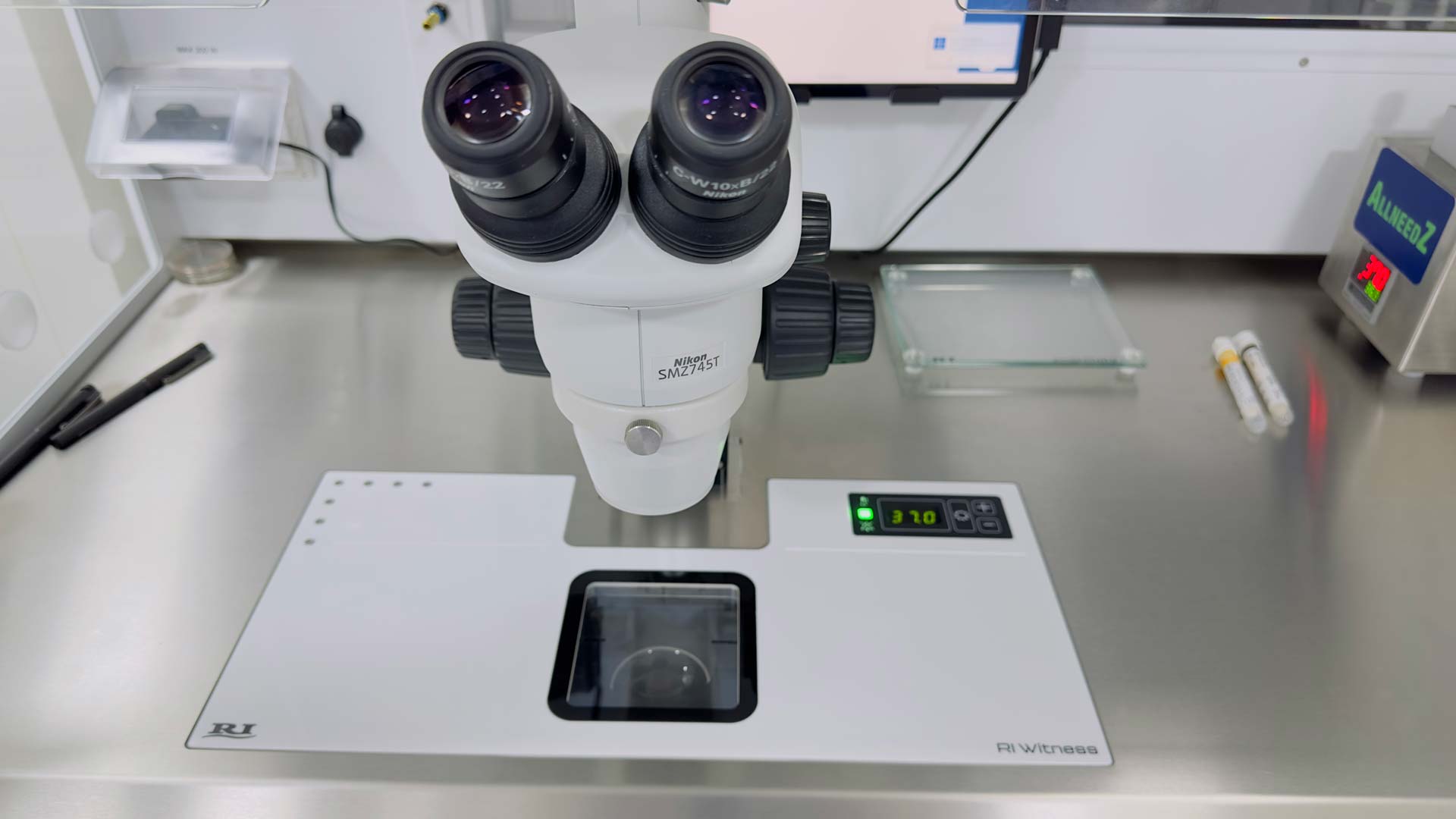What is In-Vitro Fertilization (IVF)
In-Vitro Fertilization (IVF) is a highly effective assisted reproductive technology used to help couples get pregnant. In the IVF process, eggs are collected from the ovaries and fertilized by sperm in a lab. The fertilized egg, or embryo, is then transferred to the uterus, aiming to achieve a successful pregnancy.
Infertility conditions addressed by IVF
IVF is recommended for a variety of female fertility issues including:
- Blocked or damaged fallopian tubes
- Women with ovulation disorders, premature ovarian failure, or uterine fibroids
- Individuals with a genetic disorder
- Unexplained infertility
- It also includes male factor infertility, including decreased sperm count or sperm motility
Procedure of IVF
There are several key steps involved in an IVF procedure:
- Ovarian Stimulation: In this step, medication is given to stimulate the ovaries to produce multiple eggs
- Egg retrieval: Eggs are collected from the ovaries using a minor surgical procedure
- Fertilization: The collected eggs are fertilized by sperm in a lab
- Embryo transfer: One or more fertilized embryos are implanted in the uterus.
Tests Required Before IVF
Several tests are needed before starting IVF treatment:
- Ovarian reserve testing needs to be done to determine the quality and quantity of eggs available
- Semen analysis for the male partner
- Infectious disease screening for both partners
- Uterine cavity exam is done to inspect the health of the uterus
Benefits of IVF
IVF can offer hope to those partners struggling with infertility. Its benefits include:
- Enhanced chances of having a baby for partners with infertility issues
- The ability to use donated eggs or sperm if required
- Screening for genetic conditions before implantation
- Control over timing, which allows families to plan according to personal and financial circumstances
FAQ's
When should I opt for IVF?
Fertility experts typically recommend IVF for couples who have more complex fertility issues that cannot be effectively addressed through other treatments, such as IUI. Some common reasons to consider IVF include tubal blockages, severe male factor infertility, advanced maternal age, or previous unsuccessful IUI cycles. Your fertility expert will assess your specific circumstances, medical history, and test outcomes to determine if IVF is the most suitable treatment option for you.
What are the different steps involved in an IVF cycle?
An IVF cycle consists of several steps, each designed to maximise the chances of successful fertilisation and implantation. The steps include ovarian stimulation, monitoring of follicle development, egg retrieval, fertilisation in the laboratory, embryo culture, and embryo transfer. Fertility specialists carefully coordinate and guide you through these steps to optimise the chances of a successful pregnancy.
Is IVF safe?
IVF has been used successfully for several decades to help couples struggling with infertility to conceive. Millions of babies have been born worldwide through this procedure. The procedure includes retrieving eggs from the woman's ovaries, fertilising them with sperm in a sterile laboratory, and then transferring the resulting embryos back into the woman's uterus. IVF is a highly controlled process performed by experienced medical professionals in a state-of-the-art fertility centre like Ferty9 Fertility Centre. While, like any medical procedure, there may be some risks involved, its overall benefits in helping couples achieve pregnancy outweigh any potential risks.
Are there any side effects? Will it hurt?
As with any medical procedure, there may be some side effects associated with IVF. These can vary from person to person and may include bloating, mild cramping, breast tenderness, and mood swings. These side effects are usually temporary and subside on their own. The patients typically do not experience pain during the retrieval of eggs or the transfer of embryos. The team at Ferty9 Fertility Centre takes every measure to ensure patient comfort throughout the IVF process.
How many times can one try IVF?
The number of IVF cycles a couple can undergo depends on several elements, including their age, overall health, and the couple's specific circumstances. In general, it is recommended to discuss the optimal number of cycles with the fertility specialist. While some couples may achieve success in the first cycle, others may require multiple attempts. The team at Ferty9 Fertility Centre understands the emotional and physical impact that IVF can have and provides comprehensive support and guidance to couples throughout their fertility journey.
What is the gap period required between two unsuccessful cycles?
If an IVF cycle is unsuccessful, it is essential to allow the body some time to recover before undergoing another cycle. The exact gap period required can vary depending on individual circumstances and the reasons for the previous cycle's failure. Typically, a gap of two to three menstrual cycles is recommended to optimise the chances of success in subsequent cycles. During this time, the fertility specialist may conduct further tests and evaluations to identify any underlying issues contributing to the failure of the previous cycle.
What is the success rate of IVF?
IVF success rates can be influenced by various factors, including the woman's age, embryo quality, and the couple's circumstances. At Ferty9 Fertility Centre, our success rates are among the highest in the field, a testament to the dedication and expertise of our fertility team. We understand that success can't be guaranteed, but we are committed to giving each couple the best chance to fulfil their dream of parenthood.
What are the factors that influence the success rate of IVF treatment?
Several factors can affect the success rate of IVF treatment. Some of the key factors include the woman's age, the quality of the embryos, the cause of infertility, the overall health of the couple, and the experience and expertise of the fertility centre. Younger females generally have higher success rates due to better egg quality and a higher chance of implantation. Additionally, lifestyle factors such as sustaining a healthy weight, avoiding smoking and excessive alcohol drinking, and managing stress can also contribute to the success of IVF treatment.
What extra precautions are required to be taken in the case of IVF pregnancy?
Pregnancy following IVF is a precious and exciting time. While the overall care during pregnancy is similar to that of a naturally conceived pregnancy, there may be additional precautions to consider. Regular prenatal check-ups, monitoring of hormone levels, and ultrasounds are essential to ensure the well-being of both the mother and the baby. It is also important to continue taking any prescribed medications and following the doctor's advice. We send the patient back to gynaecologists after1st trimester.
Can one travel during and after the IVF treatment?
Travel during and after IVF treatment is generally possible, but it is essential to plan and discuss with the fertility specialist. During the treatment cycle, it may be necessary to visit the fertility centre for monitoring and procedures, so it is essential to ensure availability and accessibility. If travel is necessary, making arrangements in advance and communicating with the medical team for guidance is critical. After the IVF procedure, it is generally safe to travel, but it is advisable to listen to the body and avoid strenuous activities. It is always best to consult your doctor to ensure a smooth and safe journey.



